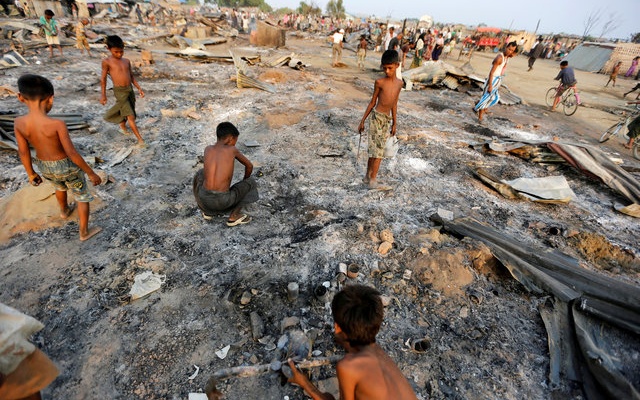More than 600 people were arrested in an army crackdown on Rohingya Muslims in the north of the restive state.
Rohingya escapees in neighbouring Bangladesh, where more than 70,000 have fled, gave UN investigators accounts of beatings, torture and food deprivation inside the jails.
Minors are among those detained.
UNICEF's deputy executive director Justin Forsyth said he had given the country's de facto civilian leader Aung San Suu Kyi details of around a dozen youngsters being held in Buthidaung prison.
"There are some children that are detained in prison, so those are the cases that we're raising," he told AFP late on Saturday at the end of a brief trip to Myanmar.
"Any child that's detained is an issue for us."
Nobel Laureate Suu Kyi and Myanmar's army chief both recognised "that there's an issue here" but made no firm committment for their release, he added.
The UN Human Rights Council has agreed to send a mission to Myanmar to probe allegations that troops and police raped, killed and tortured Rohingya in their months-long campaign.
Myanmar has rejected the accounts collected by UN investigators in the Bangladesh refugee camps, who said the crimes could amount to ethnic cleansing.
"I think ethnic cleansing is too strong an expression to use for what is happening," Suu Kyi said in an interview with the BBC last week.
UN rights envoy for Myanmar Yanghee Lee said some 450 people were being held in Buthidaung prison when she visited in January, most without access to lawyers or their families.
Myanmar has long faced criticism for its treatment of more than one million Rohingya, who are vilified as illegal "Bengali" immigrants and forced to live in apartheid-like conditions even though many have lived in the country for generations.
/257
source : AFP
Sunday
9 April 2017
1:28:31 PM
822815

(AhlulBayt News Agency) - The UN children's agency UNICEF has called on Myanmar's government to release Rohingya children detained as part of a sweeping military campaign in Rakhine state.
